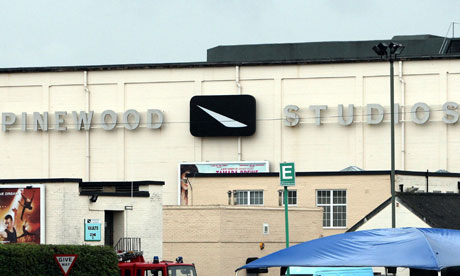
It is difficult to know, sometimes, what prime ministers are for. David Cameron turns up to visit Pinewood one week, with a heavy hint that it was time to pension off director Mike Leigh – then nine days later another minister, Eric Pickles, decides it is right to refuse permission for a £200m extension to Britain's most successful studios. The reason, of course, is because ministers don't want to build on the green belt, although another set of ministers cheerfully want to rip through the Chilterns in the name of a new high-speed rail line. Still, at least nobody could accuse the government of consistency.
Perhaps it was unfortunate that Charles Boot and J Arthur Rank bought Heatherden Hall on the fringes of London and turned it into a studio in 1936, when they should have opted for a site on an island in the Thames estuary or somewhere else where development is deemed reasonable. Nevertheless, they did, which clearly marks a cap on the limit of the film industry that Cameron is so keen to Hollywood-ise (is that a word?) with the £18m a year of lottery players' money that is available for the state funding of British film, a sum that might buy a nine-foot Na'vi in the next Avatar.
One of the points of Project Pinewood, of course, was to save British film-makers cash by providing street scenes for Paris, Berlin, New York and – excitingly – Prague. An ambitious movie on a British budget can't afford to go abroad, so as well as creating construction and then production jobs, the facility could have been useful to smaller film-makers seeking location backdrops. But perhaps they can make use of the media centre for reruns of "2012: the movie" when the Olympics are finished instead; after all the BBC decided it wasn't worth moving EastEnders there, and virtually nobody else serious wants the site, which will end up being used as a data centre, "fashion hub" or something similar.
Never mind, though, because amid all this cluelessness there is hope – or rather the strategy for British film devised by Lord Smith, the former culture secretary no less. Smith wants ITV and Sky "to invest more in the screening, acquisition and production of independent British films". In the case of ITV, one presumes Smith's aspiration is that the commercial broadcaster doesn't tell its shareholders first, on account of the fact that there is no riskier way to try to build a film studio with not much history or financing.
There is a reason why the likes of Disney and Warner Brothers are big: movies, which can have $100m production budgets, are a capital-intensive business. Sky, perhaps, could afford to do more although Smith might ask if it wants to compete with its carnivorous friends at News Corp's Fox.
What's dispiriting is that the prime minister – and presumably Jeremy Hunt, the current culture secretary, who has been the invisible man in this debate – is eager to encourage film production, a business that Britain is only intermittently good at, while standing to one side when it comes to developing film studios, an activity where Britain does well. This, though, is politicians' usual approach to British media where, with the exception of the BBC, British companies and activities where Britain is successful (yes, music) get no support.
Of course, it is not for the government to be directly responsible for media or creativity. But it is remarkable how far the government can set the rules of the game – with the most obvious example being the "terms of trade" rules that helped make our television producers and TV formats the envy of the world.
As for the film business: Pinewood is, for now, not short of work. But if the films do dry up, as another country develops better facilities, it can always follow the path of nearby Leavesden with its Harry Potter studio tours and turn itself into a mini-theme park instead.

